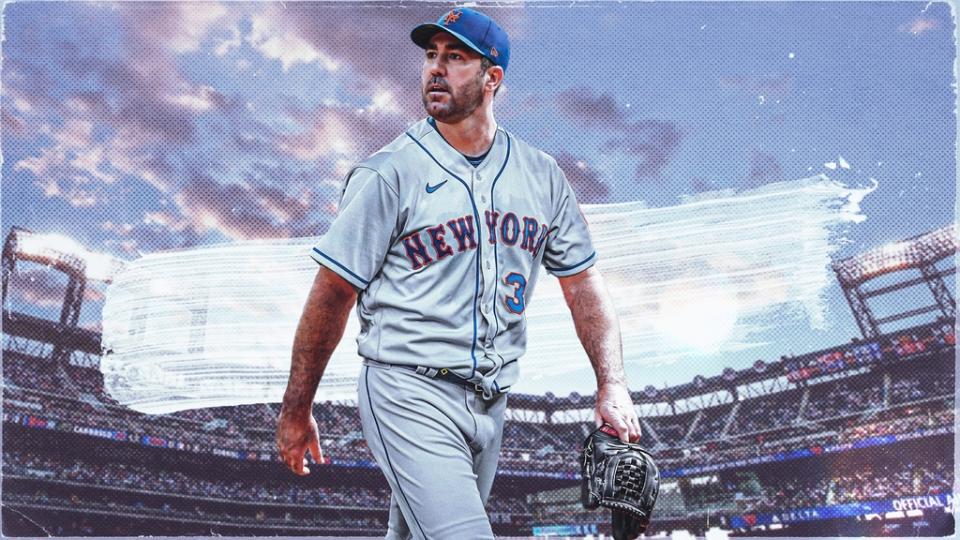
The risk is obvious. Justin Verlander turns 40 years old in February, and even for a pitcher with a long track record of remarkable durability, advanced baseball age lurks as an inevitable foe of sorts for which there is no sure-fire safeguard.
Max Scherzer is Exhibit A. Either he was limited last October by the effects of his oblique injury, which I believe, or he suddenly got old at the very worst time and there went the Mets’ grand plan for winning a championship.
Now in the wake of Jacob deGrom‘s departure, Steve Cohen is doubling down on the gamble that two old pitchers, even the greatest of their generation, can be healthy and effective after six months of a regular season and get the Mets to the finish line.
Was it the right move? I asked several major-league scouts and talent evaluators that question on Monday, after Cohen agreed to pay Verlander $86 million over the next two years — exactly what he’s paying Scherzer. And the unanimous answer was yes, largely because there really is no other way for a franchise committed to winning a championship as soon as possible.
“They really had no choice,” is the way one scout put it. “They’ve got an old roster, starting with Scherzer, and they have no high-end pitching coming out of their minor-league system for at least a couple of years.
“Cohen wants to win now and there’s no way to do it without paying top dollar for pitching. So you replace deGrom with Verlander and take another shot. If he and Scherzer are healthy for the postseason you’ve got a legitimate chance. The only other option was to sign (Carlos) Rodonand to me, even though he’s younger, he’s a bigger risk because of his injury history.”
That was the most significant consensus opinion from the people I spoke to, including someone in the Mets’ organization: that Verlander is a better bet than Rodon, based on injury history and the length of the contract.
“Verlander is just a beast,” a second scout said. “He was never hurt until his late 30s, and then he bounces back from Tommy John (surgery) to win the Cy Young Award at age 39? You can’t overstate how impressive that is or what it tells you about its durability.
“He’s an outlier in that respect. I’d take him over Rodon, who’s had a history of arm injuries that goes back a long way. That history, for me, is more significant than the difference in age.”
At 30, Rodon is essentially 10 years younger than Verlander, which is why I had been thinking he made more sense for the Mets. But in addition to Tommy John surgery, he’s had shoulder problems, adding up to a ton of missed time until last season with the San Francisco Giants when he threw 178 innings, the most ever in his eight-year career.
Verlander, by contrast, has been a machine throughout his career, pitching over 200 innings in 12 of 13 seasons until tearing the elbow ligament in 2020, requiring Tommy John surgery. Four times he led the majors in innings pitched including in 2019 at the age of 36 when he threw 223 innings for the Houston Astros while earning the second of his three AL Cy Young Awards.
“When a guy does it year after year after year it tells you he’s a special arm,” the Mets’ person said, “and he’s likely to push the boundaries on pitching at a high level as he gets older. It doesn’t mean he won’t pull a hamstring or something. That risk increases for any pitcher who gets older, as we’ve seen with Max.
“But when you see what Verlander did coming back missing two years, at his age, it says a lot. And he wasn’t tricking hitters. He’s still a power pitcher, throwing his high fastball, and he’s still got his great breaking stuff, the slider and curveball. He pitched to a 1-something ERA (1.75), for goodness sake. And from what I’ve been told, he’s every bit as driven to compete and win as Max. That’s as good as it gets.”
So what’s not to like? Well, Verlander struggled somewhat in the postseason. He did pitch six strong innings against the Yankees in the ALCS but he got smacked around by the Seattle Mariners in the ALDS and gave up a 5-0 lead in Game 1 of the World Series, adding to his mysteriously poor career record in the World Series.
In fact, Verlander was 0-6 in eight World Series starts before finally earning a win in Game 5 against the Philadelphia Phillies, allowing one run in five innings. He still has a 5.63 career Series ERA, although he has pitched well in other postseason rounds, but as the Mets’ person said, “I think everybody would be happy to get to the World Series and then worry about that.”
So while deGrom is gone nothing really changes. The Mets will take another shot at winning it all with elite, but aging, starting pitching. They’ll have six Cy Young Awards in their rotation now rather than five, three each for Scherzer and Verlander.
But to make it work the Mets will need to do a lot more work on the pitching front, adding to the rotation and the bullpen as well, knowing they’ll need to manage the workloads for both of their aces over the course of a long season.
After all, Cohen isn’t shelling out for the two highest-paid pitchers in the game to add to their Cy Young trophy cases. He’s taking the best gamble his money can buy to make next October different from this last one.